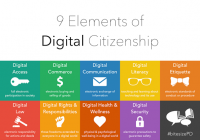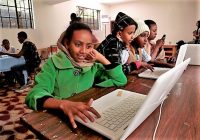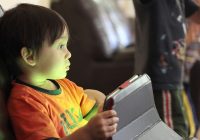Tag Archives: social
Watch: SI’s Cliff Lampe on social media shutdowns
The move by Twitter, Facebook, and Snapchat to remove or suspend President Donald Trump’s accounts and decisions by Google, Apple and Amazon that led to a shutdown of Parler continues to bring questions about the unchecked power of social media and the future of the platforms. Watch the video or read excerpts from the interview with Professor of… Read More »
Young kids’ YouTube viewing dominated by consumerism, ads
A recent report by Michigan Medicine and non-profit Common Sense Media finds children are often consuming pervasive and inappropriate advertising, violence, and other questionable content while watching online videos. Children ages eight and under are now spending more time on YouTube than ever before, with online video viewing for the first time surpassing live television and streaming video… Read More »
Ad-free, censorship-free social sites MeWe, Parler see surge in interest postelection
Since the Nov. 3 election, people—particularly President Trump supporters—have been flocking to social media platforms Parler and MeWe, which promise ad-free or uncensored experiences. MeWe’s promise is “Your private life is not 4Sale: No ads. No Spyware. No BS.” Parler calls itself “the world’s town square,” inviting participants to “speak freely and express yourself openly.” Libby Hemphill, associate… Read More »
Why don’t we click on some social media posts?
Why do we click on some social media posts but not on others, even if we’ve taken the time to read and think about them? That’s what researchers at the School of Information asked in a recent study, taking a deeper dive to better understand a concept they coined as the “non-click.” Their study found that the decision… Read More »
Professor rolls with changes in the digital media world
Since Lisa Nakamura began teaching courses about digital media in 2001, the course themes have evolved every year to match the fast-paced change within the online world. In addition to the changes within digital environments, student interests and aspirations have also changed. “I see more that students want to build an app that helps society,” she says. “There’s… Read More »
U-M celebrates Class of 2020 with day of online tributes, social media
U-M leaders, alumni, notables join in pandemic-altered virtual party Congratulatory video messages and other virtual activities replaced traditional commencement ceremonies as the University of Michigan community celebrated the Class of 2020 online amid the coronavirus pandemic. President Mark Schlissel, former U.S. Vice President Al Gore, university deans, notable alumni and many others were part of a daylong online… Read More »
Student-centered events at Dearborn are getting a reboot online
As classes moved online last week and most UM-Dearborn staff started working from home, one vital part of campus life was left mostly on the sidelines in the wake of new social distancing measures: in-person university events disappeared from the calendar. Dean of Students Amy Finley says that was a particularly big blow to students and student organizations. But… Read More »
Practice and encourage good digital citizenship
Do your part to support online civility and practice and promote good digital citizenship. Be responsible and respectful in self expression, and expect respect from those you interact with. Help care for digital resources by encouraging good security practices. Respect others’ privacy, and take steps to protect your own privacy by staying aware of what you share online.… Read More »
Older adults cautious about using online physician ratings
Online ratings can help with making decisions on everything from hotels to hair stylists. But online ratings of physicians? A new poll by the U-M Institute for Healthcare Policy and Innovation suggests they don’t yet hold as much sway with the Americans who use the most health care: people over age 50. In all, 43 percent of people between… Read More »
Eating and Tweeting: What social media reveals about attitudes on food
An interdisciplinary group of U-M researchers turned to Twitter to see whether online discussions about food can help inform policy makers. They used community-based surveys to gather demographic and health-related behavior information that might help explain health status and disparities between groups, and whether there were differences between how groups of residents of a given region discussed food. Their… Read More »
Temporary social profiles may help adults vet feedback on sensitive topics
Temporary social profiles are being used for more than just online scams and disinformation. Tawfiq Ammari, a PhD candidate in the School of Information, says these “throwaway” accounts might help adults collect helpful comments and feedback on “socially stigmatizing” topics such as divorce, postpartum depression, and mental health.
Computer science classes may have positive social effects
Researchers from U-M, Cornell University, and the Nairobi Play project studied the social and cultural effects of computer science classes. The researchers found that computer science classes can encourage children to work together overcome cultural barriers. Kentaro Toyama, a professor in the School of Information, was part of the team. The researchers interviewed and observed children from a… Read More »
Gamified childhood: Are digital devices replacing traditional playtime?
Blocks, books and bikes used to be the staples of childhood. But as more kids grow up with a seemingly endless menu of virtual activities offered through digital media, child development experts worry about the wane of traditional playtime. Jenny Radesky, a pediatrician at U-M’s C.S. Mott Children’s Hospital, who is addressing the topic at the national American Academy of Pediatrics meeting in… Read More »
Millennials are the most tech-saturated generation of parents yet
The spectrum of digital child-rearing resources for millennial parents is huge. Beyond social media and forums and Google, there are smartphone apps that log the duration of every breast-feeding session, record an infant’s nap times to the minute, and send push notifications reminding parents of upcoming developmental milestones. Those tools can be useful. But when it comes to… Read More »
Designing social technology for rural areas
When we think about the technological divide between urban and rural communities, our minds likely go to infrastructure—a lack of a physical grid, wiring, or towers to connect those in remote communities. While this is a large part of the issue, School of Information doctoral student Jean Hardy says a bigger concern is the lack of innovation in the way… Read More »
Fighting fake videos with improved computer vision
Contributing to a project that aims to detect “deepfake” videos, U-M engineers developed software that improves a computer’s ability to track an object through a video clip by 11% on average. The software, called BubbleNets, chooses the best frame for a human to annotate. In addition to helping train algorithms for spotting doctored clips, it could improve computer… Read More »
Is ‘digital addiction’ a real threat to kids?
There’s a great deal of talk these days about “digital addiction.” But several experts from U-M say we should teach kids to think of screens as something to handle in moderation rather than something without any healthy place in our lives. Ellen Selkie, an assistant professor of adolescent medicine, who does research on adolescents’ use of social media,… Read More »
‘Dissonance’ event explores AI, draws crowd
Dissonance: Understanding the Social Implications of AI, April 17
Through mobile phones, the Internet of Things, and web computing, every single day around the globe we create a quintillion bytes of data. Pairing that trove of data with enormous computational power, Artificial Intelligence (AI) is making strides into every aspect of everyday living, from emails and targeted advertising, to healthcare and education. But with great power comes… Read More »



















